Memphis' SCORPION and Atlanta's COP CITY: There's a pattern here
The policy of the Memphis PD was to “clean up the streets.” We see how that worked out. In Atlanta, 1,000 National Guard may be called up to evict violent protestors from "Cop City"
*Editor’s note: The count of relieved officers now stands at seven, with five Black officers charged with murder. This is still tragic, of course, but I’m a bit disappointed that the media narrative seems to be shifting to the white officers who “failed to stop” the violence versus the Black officers who allegedly committed murder.
Memphis, in 2021, had over 300 murders. In 2019, the city’s murder rate per 100,000 was 29.21, according to FBI data. That put it in the top ten violent cities in America. Atlanta was number 22, with a rate of 19.53. In 2021, Cerelyn Davis, Memphis’ first Black chief of police, initiated the SCORPION (“Street Crimes Operation to Restore Peace in Our Neighborhoods”) unit to clean up the city. It was a spectacular success, until it wasn’t.
By May, 2022, Davis touted SCORPION as the key to her crime reduction effort. From the New York Times:
“We created the new Scorpion unit,” she said, adding: “This unit basically targets some of the hot-spot areas where we saw frequent aggravated assaults and high crime.”
Activists opposed SCORPION because of its heavy-handed methods and “mass pullovers” to root out crime. The unit relied heavily on traffic stops to seize drugs, weapons, and to arrest those who possessed them illegally. Let’s think about that. Anyone—not an expert on policing—who thinks this through might realize it could only end the way it did, with tragedy. If it wasn’t Tyre Nichols’ death, it would have been someone else. Given everything we’ve seen in the news about policing at the city and community level, programs that rely on groups of officers conducting stop, search and seizure arrests day after day inevitably overstep their mandate, typically with very poor, even deadly, results.
Someone is going to run from the police. The police are going to chase them, catch them, and force them to comply. I don’t know all of the details about Tyre Nichols: Why he was stopped; why officers didn’t just send a unit to watch his mother’s house, which was just blocks away from where he was caught and beaten. Since six officers* have now been relieved of duty, five have been charged with murder, and the entire SCORPION unit has been disbanded, we can assume Nichols didn’t threaten officers’ safety in such a way as to justify their reaction.
But it’s not just an isolated incidence of “bad policing” here. It’s certainly not racism, at least not in the traditional sense of the word, since the five officers charged are all Black. It’s not even really a denouncement of so-called “police culture.”
“Changing a rule doesn’t change a behavior,” said Katie Ryan, chief of staff for Campaign Zero, a group of academics, policing experts and activists working to end police violence. “The culture of a police department has to shift into actually implementing the policies, not just saying there’s a rule in place.”
Well, the policy of the Memphis PD was to “clean up the streets.” We see how that worked out.
We always see how it works out when “the streets” are targeted zones where Black people live their lives every day, and “clean up” means stop the maximum number of people for small infractions, to catch enough people that would make certain planned activities, like drug sales, gang activity, robberies and other property crime, more difficult and therefore more likely to be conducted elsewhere—as in outside the city limits. The streets get “cleaned up” in Memphis (or Boston, or Washington, D.C., or Atlanta) but the crime continues, just somewhere else.
It works until someone is killed because the squad doing the cleaning up gets comfortable with chasing, collaring, and “roughing up” their targets.
After the tragedy, comes the backlash.
Now comes the “defund” protestors, who have their own brand of violence. Then the very cities the leaders sought to clean up end up drenched in blood, or ashes.
There’s a pattern here, but politicians who run on a “law and order” platform, and the senior police officials who work for them, refuse to see it because they want to give the citizens “safe” streets—meaning the citizens who are loudest about crime, until the protestors are louder.
Memphis was just another city going through the same pattern as Baltimore, Minneapolis, or Atlanta. The cities are different but the patterns are the same. They lead to a vicious cycle which not only damages the communities where “clean up” squads operate, but also the police as an institution.
Like in Atlanta. In June 2020, protestors burned a Wendy’s restaurant where Rayshard Brooks, a 27-year-old Black man, was shot and killed by a a white officer while Brooks was attempting to flee with the officer’s taser weapon. That episode led to the resignation of Erika Shields, the police chief at the time. Shields, who is white, is now the chief of the Louisville, Kentucky police department. She was very popular with the street beat cops.
The officer who shot Brooks, Garrett Rolfe, was terminated and charges were filed. Less than a year later, after an appeal to the Atlanta Civil Service Board, Rolfe was reinstated, because he “was not offered his right to due process.” By August of 2022, prosecutors dropped charges after it was determined the shooting was justified given the circumstances. But the damage to APD was done. Hundreds of officers fled to other jurisdictions, retired, or left law enforcement for good. The department, according to Chief Rodney Bryant, is short 500 officers.
The pattern continues when officers don’t want to serve in an environment where they are told to “clean up” crime and then someone messes up, and the pendulum swings back toward “defund,” making cops become mental health counselors, and creating byzantine rules of what can be done when, in situations where seconds determine if an officer is a victim, or a violent criminal escapes to terrorize more innocents. Remember that officers do this job day in, day out. They are lied to, threatened, and find themselves in situations where any traffic stop could lead to their own death. If they’re wrong, they could lose their job, or their freedom.
It’s easy to prosecute five cops who beat an unarmed man to death. It’s harder when someone like Garrett Rolfe did the right thing and the department was shaken to its core. But Atlanta needs 500 officers or the whole place will continue to be overrun with violent crime—including fifteen-year-olds shooting a security guard at a high-end mall.
To entice new recruits to serve in Atlanta, in the fall of 2021 then-Mayor Keisha Lance Bottoms accepted a proposal to utilize 90 acres of land known as the South River Forest as a new police training facility. The “forest” sits a few blocks from Zoo Atlanta, just outside city limits but inside the “perimeter” loop of Interstate 285 which forms a belt around the city.
The land boasts a sketchy history: first as a site in the infamous Trail of Tears that saw the expulsion of the Creek Indian tribes, then as plantation land worked by slaves, and for a large part of the 20th century, a prison farm run by the City of Atlanta.
The Atlanta Police Foundation, which is funded by some well-known wealthy Atlantans such as Alex Taylor, CEO of Cox Enterprises, proposed a $90 million plan—$30 million to be paid by the city—to construct an advanced law enforcement training center on South River Forest land. Opposition was fierce. After 14 hours of mostly critical public comments, the City Council approved the proposal, including current Mayor Andre Dickens, who voted for it.
“We’re at this juncture where yes, the vote didn’t go the way that we wanted to, but also, we have built this community and we have activated this community of people who care about this issue and are not going to stop talking about it. We’re not going anywhere,” [climate activist Shehza] Anjum said Wednesday night.
Note the term “activated this community of people.” There exists a cottage industry of community activists well practiced in assembling their own crew of avengers from out of town to handle these kinds of situations. The residents get to suffer while young Antifa goons and educated self-righteous Uber-liberals show up to ensure more violence.
Current Mayor Dickens, a Democrat, ran on a law-and-order platform. Dickens is an engineer with a Georgia Tech education, and he believes he can use critical thinking skills to get out of this cycle of crime and police brutality. Governor Brian Kemp is a white Republican; Dickens is a Black Democrat and they both agree that the South River Forest project is needed, and that protestors won’t stop it.
Anyone could see where this leads. The squatters and their fellow travelers resorted to more and more disruptive and violent behavior as the plans to construct the training facility proceeded. On social media, protestors, some who are associated with Antifa, and many who came from out of state, promoted a “Night of Rage” on January 20th.
The news is now filled with homages to the protestor who was killed by police when the Georgia Bureau of Investigation acted to expel the squatters. (Just Google “south forest protestors shot at police.”) The man, called “Tortuguita,” is described as a 26-year-old “beloved queer community organizer,” a “forest defender.” There is an argument over who shot first: the Georgia State Patrol claims they returned fire after an officer was shot.
“Tortuguita” has a real name, Manuel Esteban Paez Terán. He is a Venezuelan who attended Florida State University in Tallahassee, having graduated Magna Cum Laude with a degree in psychology in 2020. He was a leftist activist who answered the call. Someone shot first, and a GSP officer was struck with a bullet; his body armor saved his life. No so with Terán. Such a waste of human potential. In another version of history, someone like Terán—also known as “Manny”—would have been an ideal recruit for a police department interested in defusing situations instead of using overwhelming force.
The protestors are not afraid to burn, shoot, and bully their way into eliciting a violent response from the authorities. Gov. Kemp has declared a state of emergency over the situation in the South River Forest, which authorizes the activation of up to 1,000 National Guard. It’s hard to escalate beyond the use of military force.
It seems the pattern is hard to break. Citizens want to live free from rampant crime and violence. Politicians vow to clean things up. Police are set on a course where things appear to work, and eventually they make a mistake, because that kind of policing—stop, search, and detain—leads to people who run or fight. Then there’s the backlash and the organized effort to escalate. Then the police get decimated by politics. Then there’s the flight of police officers. Then there’s the vow to build a better police force, and the cycle starts over again.
To me, the problem is a political one. Politicians lack the will and the staying power to properly manage policing. I don’t know the solution, but perhaps having a separate structure for public safety, wholly separate from the politics, might be a good place to start. I am a firm believer in federalism, local rule, and local solutions to local problems. But sometimes, a problem is too big to fix locally. When local police become corrupt, the state can act to take over policing. But even that is not a permanent solution, because large organizations with unlimited police power eventually become corrupted by it.
Don’t get me started about the interstate network of activists. J. Edgar Hoover would have had a field day with them. But current political reality—even during the last U.S. president’s term—does not permit that kind of action. I will say that the left’s version of organizing is much more, er, organized than the alt-right’s “playtriot” brigades (like the ones who showed up on January 6th, 2021). Regardless of the motivations of protestors, they didn’t create the initial problem, they just worsen it.
What should the state, or this nation, do when a large city department succumbs to the vicious cycle of police violence, regression, reactionary leniency, an eruption of crime, then recruiting like mad, attracting more violent, overzealous officers, and right back to brutality? We need to answer this question before every city in America has its own version of SCORPION, Tyre Nichols, and the South River Forest raid.



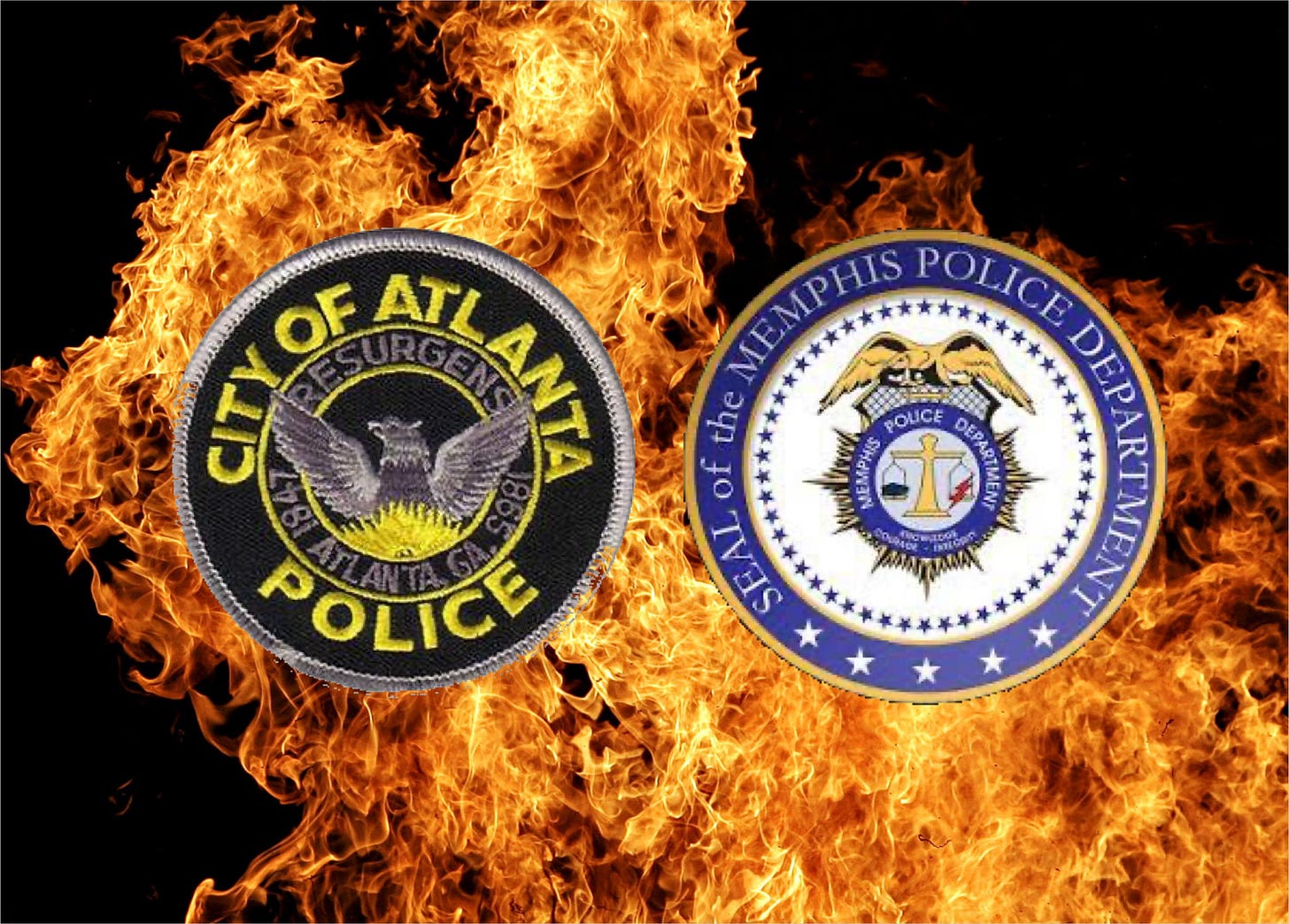

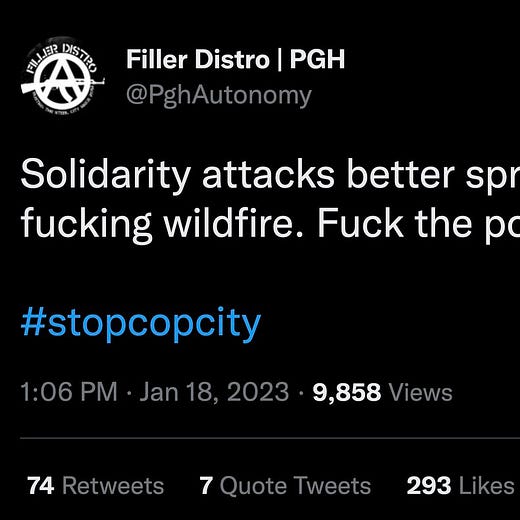
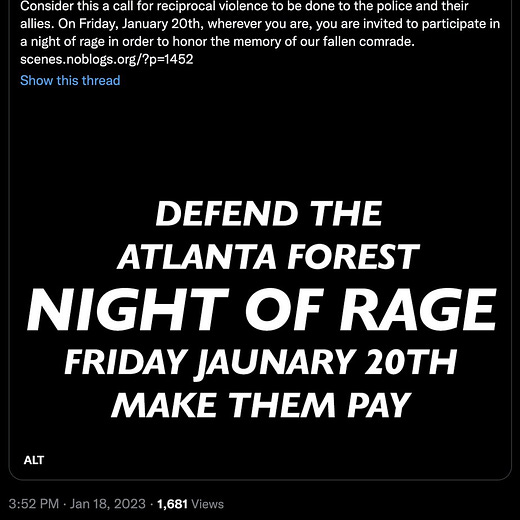
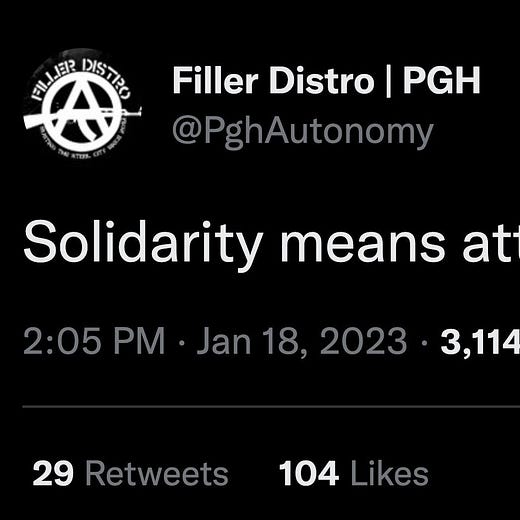
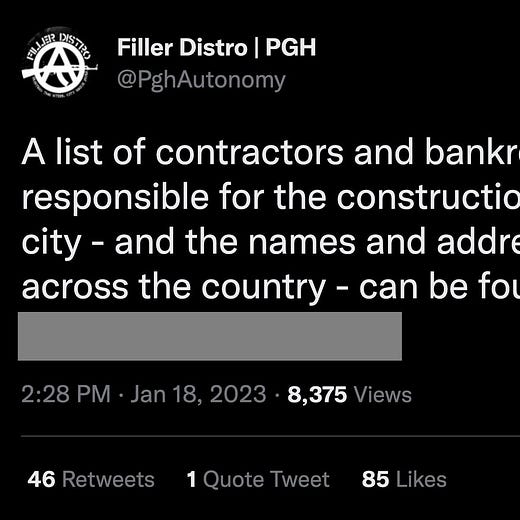
While the "defunders" (for lack of a better term) are way off base in terms of trying to eliminate policing entirely, there are good ideas in terms of setting up non-police public safety/response units who are trained to deescalate situations.
I agree that the problem is political. Like everyone else, I do not know how to hold the people running the show accountable to the citizens without politics.